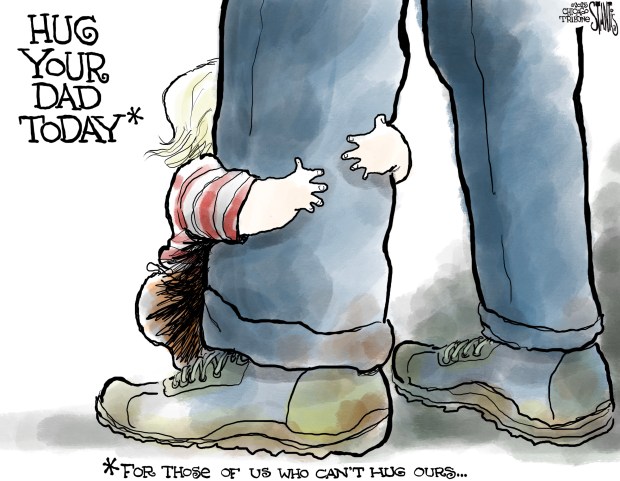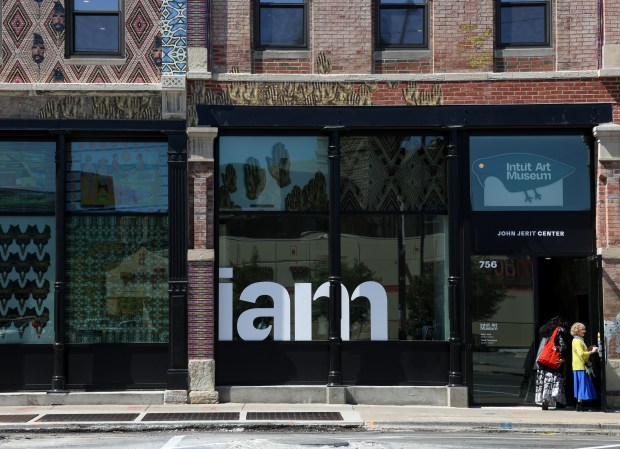In its April 1 editorial (“Chicago Teachers Union ‘won’ what was long on the table. Financial strife abides”), the Tribune Editorial Board rightly calls out Mayor Brandon Johnson and Chicago Teachers Union President Stacy Davis Gates for labeling the new contract between the CTU and Chicago Public Schools “transformative.”
As a CPS parent of five from the Austin neighborhood, I’m relieved that an agreement was reached. But if this contract is truly “transformative,” then Chicago families must see and feel its impact on our children. This means tangible improvements in student learning and social-emotional well-being. Otherwise, what exactly did the mayor, CPS and the CTU fight for?
For months, CPS parents like me urged the district and union to set politics aside and prioritize students. I once believed the CTU cared about our kids because that is its message in the media. But I have witnessed, and now know firsthand, how the union has sidelined and disrespected parents. Throughout the negotiations, other parents and I tried to engage in the process, including reaching out to the CTU on multiple occasions to share our perspectives, but we were shut out and ignored.
Over the past year, we’ve watched a political standoff unfold, uncertain if a strike was imminent. The mayor claims victory in avoiding one, but he should remember he no longer works for the CTU. He works for the people of Chicago.
The CTU should also remember this: Without CPS families, there are no students to teach. Teachers’ jobs depend on us. While the district and union tout their efforts for parents, we know our children and communities best. We don’t need saving.
Families are growing increasingly disillusioned with CPS. Many parents are considering leaving the district — and some have already left. This should concern everyone invested in public education and our city. Trust between CPS, CTU and the families they serve is fragile, and without intentional action, it will continue to erode.
With CPS facing mounting challenges and new federal threats to public education, we can’t afford more of the same. Now, more than ever, we need honesty, transparency, communication and collaboration. Our children’s futures are at stake, and we will not sit idly by while bureaucracy and politics take precedence over their education.
— Blaire Flowers, member, Parent Advisory Board, Kids First Chicago
A critical challenge
The editorial “Teachers contract won’t end the drama over Chicago Public Schools” (April 29) focuses on a piece of a larger critical challenge facing Chicago Public Schools, Chicago, and, into the bargain, the regional transportation agency and the state of Illinois. Every major government entity with a responsibility to do better, differently, and more for city and state residents is teetering on the edge of financial disaster.
Yet, as the editorial points out, Mayor Brandon Johnson is relentlessly engaged in an effort to force CPS to float a bond the system can’t afford in order to raise revenue for a city facing a budget deficit it can’t close. The only clear result of that pressure has been to vilify outgoing CPS CEO Pedro Martinez and create a high-level vacancy that will be filled at significant additional cost. This is happening while the CTA, Metra and the Regional Transportation Authority also face huge budget deficits this year and larger ones in succeeding years.
Johnson’s other efforts to close the budget gaps so far appear to include ruling out staff cuts and meaningful tax increases and insisting that Gov. JB Pritzker, reckoning with unmet state pension obligations, come up with funds from some unknown source to bail the city out.
From where I stand, as a paid passenger on the same full boat, there appears to be a large iceberg ahead.
— Jeff Epton, Chicago
The craft of the shine
After being let go late last year, I suddenly found myself rich — in time, if not in funds. With interviews going nowhere fast, I filled my idle hours writing and slowly reclaiming my home, one dusty room at a time. On one such domestic excavation, I unearthed a long-forgotten pair of shoes. When I slipped them on, they sparked a flood of memories — adventures once had, places once walked, people once met. I pranced around reliving some of those moments until I looked down and realized that although the shoes were bright, their color was dull.
A quick call to a friend led me to Boss Shine & Repair Shop. With shoes in hand, I jumped in my car, and as I drove through the area, I noted the telltale signs of gentrification: construction of sleek condos, artisan coffee shops (coming soon) and that eerie feeling that the locals might soon be priced out of their own block.
Boss Shine & Repair Shop, however, was a delightful time capsule. When I walked in, I was greeted by rows of shoes — every shape, size, fabric and color imaginable. I must admit, some of the men’s shoe styles I haven’t seen since my great-grandfather’s homegoing in Mississippi. Calvin, the frontman of this operation, inspected my worn pair with the seriousness of a surgeon. He quoted a fair price, and I nodded. Then came Michael, a spry elder with a twinkle in his eye, who whispered that the price could drop a couple of dollars — if I wore them during the shine. A live performance? Why not.
Perched in an elevated chair, I placed my feet in its rest like royalty. As Michael worked, he shared his story: He’d been shining shoes since the ’50s, just a kid then, doing weekend shifts to save up for clothes and shoes his mom couldn’t afford. Decades later, he still found pride in the polish.
When he was done, my shoes gleamed. I tipped him well — not just for the shine but for the craft, the conversation and the care.
In an age of fast fashion and faster service, Boss Shine & Repair Shop reminded me what taking pride in your work means. I’ll be back — with my leather boots.
— Bernina M. Moore, Chicago
How we find greatness
David McGrath regularly demonstrates a unique talent for taking a routine event, at the micro level, and revealing its greater significance at the macro level. In his essay (“Mourning my sister Rosie with loved ones, I felt a spiritual rising,” April 19), what starts out as a moving tribute to his older sister and the description of her funeral transforms into a moving tribute to something much bigger: the close-knit communities that played and worked together, participated in religious and military service together, and continued to eat and drink together throughout their lives.
This generational sense of community made Chicago neighborhoods great and, in so doing, made Chicago great. Then the final paragraph transforms again into something even bigger: the spirit of Easter and the spirituality that connects all humans, the living and the dead.
His essay reminded me of the words of the poet Friedrich Hölderlin: “We are nothing; what we seek is everything.” Greatness is not about accumulating power and wealth; it’s about seeking something bigger than ourselves and who we help along the way.
— Franz Burnier, Wheaton
Submit a letter, of no more than 400 words, to the editor here or email letters@chicagotribune.com.




